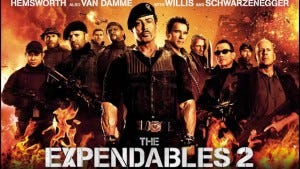Are heroes in action movies getting older?

Last week there was a long and well-written piece in The Guardian commenting on the recent trend of stars in action movies getting older. It covers a number of topics but its main thrust is that action stars are getting older because we want different things from our action heroes than we once did. The author, Adam Mars-Jones, posits that increasingly the most important attribute for an action heroes is 'gravitas'. He writes...
Gravitas is the indispensable element in this context: the moral stature that can complement physical power and even make it irrelevant, which seems to be viewed culturally as a male preserve. This quality is hard to define, though, even as it applies to men. Perhaps it is simplest to describe it in negative terms, as “what Tom Cruise will never have”... To have gravitas means to inhabit your history, and not to be diminished by your losses. And if that isn't quite the same thing as real-world maturity, on the big screen it is the best we are going to get.
The piece looked at a few particular stars, rather than measuring the average over time. So I thought I'd take a look and see if indeed our action stars are getting older. In summary...
Between 1996 and 2015, the average age of an 'action star' was 40 years old
The year with the lowest age was 2005, when the average 'action star' was a sprightly 35.5 years old
In the first six months of 2015 we have seen the oldest average age at 48.4 years
40% of stars in action movies were aged 30 to 40 years old and 29% were 40 to 50 years old.
During 1996-2015, the average age of directors of action movies was 45 years and 10 months.

Warning - Research such as this is always slightly speculative. Defining which action movies to include as well as what makes a ‘star’ will inevitably affect the results. Therefore, at the bottom of the article I've been clear about my methods and criteria so you can judge for yourself how valid you think my findings are.
In fact, if we go by length, a whopping 47% of the following article is the methodology, caveats and mitigation, with just 37% showing the results. Sorry - normal service will be resumed next week.
Average age of action stars
Between 1996 and 2015, the average age of an 'action star' was ever-so-slightly under 40 years old (39 years, 11 months and 15.8 days, to be precise).
The year with the lowest age was 2005, when the average 'action star' was a sprightly 35.5 years old. In the first six months of 2015 we have seen the oldest average age at 48.4 years.

40% of action stars were aged 30 to 40 years old and 29% were 40 to 50 years old.

Average age of directors of action movies
While my main focus was on actors, I thought it would be fun to also measure the age of the directors of my 500 films. Between 1996 and 2015, the average age of directors of actions films was 45 years and 10 months.

39% of action film directors are between 40 and 50 years old.

Methodology

I drew up a list of the 500 films on IMDb with the largest number of votes from users which also met the following criteria...
Live action feature films
Made partially or wholly in either America or the UK
With 'Action' as one of the three main genres
Released in cinemas between 1996 and July 2015 inclusive
I defined which of the actors were the 'action star(s)' (see below for details), found their date of birth from IMDb and Wikipedia and then cross-referenced that with the US theatrical release date to find their age at the time of release.
I chose to look just at the top 500 action movies (as defined by the number of IMDb user votes) in order to ensure that I'm looking at the most visible films within the action genre. These are not the 'best' films, just those which motivated the IMDb user-base to rate. The highest rated film in the list is The Dark Knight with 9.0 out of 10 and the worst is Battlefield Earth with just 2.4 out of 10. The average rating for my list of films was 6.5 out of 10.
Defining a ‘star’
This process is rather subjective so I created rules to keep the classification consistent.

I primarily went for the ‘marquee names’, i.e. The people who are on the poster selling the film. For most action films this was the lead actor/actress, and sometimes also the lead physical villain. For example, for ‘The Dark Knight Rises’ I regarded the ‘action stars’ in this film to be Christian Bale and Tom Hardy, not Gary Oldman (not an 'action' character) or Joseph Gordon-Levitt nor Anne Hathaway (who both play supporting roles).
I excluded ensemble films with no clear action lead, such as Smokin' Aces and Watchmen.
I focused on the actor(s) who is the main physical star in the film, not just the biggest star in an action film. For example, in 'Spy Game' Robert Redford and Brad Pitt star but only Brad Pitt is the 'action star'.
I did not assume that the male lead was automatically the 'action star' (although thanks to Hollywood's male-focused casting invariably he was).
The average number of 'action stars' per film was 1.2, with 79.6% having one star, 19.6% having two and only a few having three (such as Charlie's Angels and its unnecessary sequel). This gave me a pool of 609 appearances to track, from 240 individual actors.
Defining an ‘action’ film
In the past, I have performed many studies based on genre and broadly-speaking genre is a useful way to classify different types of films. However, when we want to study a single genre then we start to notice that the genre system is not quite as robust as it first seems.
Wikipedia defines the action genre as “Action film is a film genre in which one or more heroes are thrust into a series of challenges that typically include physical feats, extended fight scenes, violence, and frantic chases”. I wasn't able to make this subjective decision for each film so I relied upon IMDb's genre classifications.

IMDb lists up to three genres for each film, meaning that its classification of 'action film' will include films which have some actions sequences but whose primary genre is not action. This means that within my list of films for today's research there are some films not normally regarded as pure action films, such as Maleficent and Spy.
Some comedy action films play against type when casting their 'action stars', such as Rowan Atkinson in Johnny English and Steve Carell in Get Smart.
I excluded animated films from this list as the age of the voice actor often has little relation to the age of the on-screen character.
By the same token I excluded voice actors who are the underlying talent to CGI characters (such as Andy Serkis in Rise of the Planet of the Apes, Andy Serkis in King Kong and Andy Serkis in everything else he’s been in). There are some borderline cases, such as Chappie, where the main 'star' is a CGI character but there are other action characters within the film (in the case of Chappie it's Dev Patel. Hugh Jackman and Ninja). In these cases I opted to not include the films.
Release dates

I used IMDb and Wikipedia to find the first date of release for each film, which in 97.4% of films was the USA.
Of the 500 films, 87 were released between 1996 and 2000, 121 between 2001-05, 137 between 2006-10 and 155 between the start of 20011 and July 2015.
Determining age
I used IMDb and Wikipedia to determine the date of birth for my 'action stars' and directors. If their date of birth was incomplete (mostly for older directors, although not exclusively) then for those with months and years I assumed they were born on the 1st of the month and for those with only a year of birth I assumed they were born on the 1st of January.
Films normally take between 12 and 24 months from shooting before they are released so to get a true measure of the age of the action star at the moment of filming then the results above need to be reduced slightly. I have not accounted for this as each film has its own schedule and it's not possible to find shooting dates for every film.
I found a full date, month and year of birth for 88.8% of my actors and directors. Only 16 people have managed to keep their day, month and year away from the internet.
Epilogue

This research proved harder than I first envisaged, mostly due to the high number of subjective decisions. Normally, I like to have robust criteria which provide a definitive result. I try to imagine that if someone else were to fact-check my research, using my stated methodology, then they would come up with the same results I have.
In this case, I suspect that everyone performing this research would have ever-so slightly different views of who's the 'action star' in the films I studied. I also made some bold decisions in the criteria (sticking to IMDb's action genre classification and only looking at the most popular films according to IMDb user votes), which will have affected the results.


